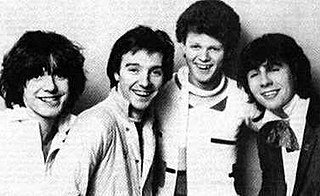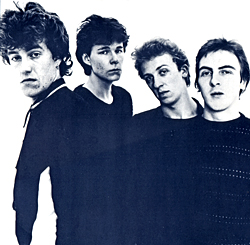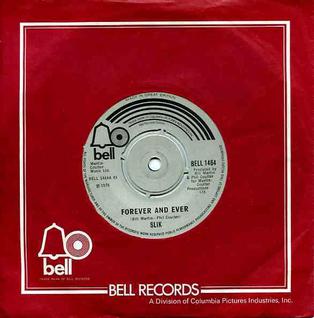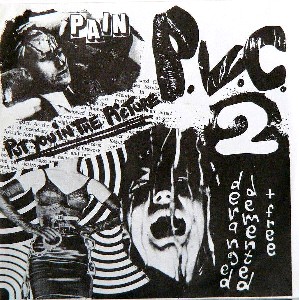Related Research Articles
Richard Jobson is a Scottish filmmaker who also works as a television presenter. He is also known as the singer-songwriter of the band Skids.

James "Midge" Ure is a Scottish musician, singer-songwriter and record producer. His stage name, Midge, is a phonetic reversal of Jim, a hypocorism of his given name. Ure enjoyed particular success in the 1970s and 1980s in bands including Slik, Thin Lizzy, Rich Kids and Visage, and as the second frontman of Ultravox. In 1984, he co-wrote and produced the charity single "Do They Know It's Christmas?", which has sold 3.7 million copies in the UK. The song is the second-highest-selling single in UK chart history. Ure co-organised Band Aid, Live Aid and Live 8 with Bob Geldof. He acts as a trustee for the charity and also serves as an ambassador for Save the Children.

Rich Kids were a short-lived new wave band from London, founded in 1977 by Glen Matlock following his departure from the Sex Pistols. The band also included future Ultravox member Midge Ure and Rusty Egan, who both later founded Visage together. They released one album and three singles during their existence, from March 1977 to December 1978.

John Alexander McGeoch was a Scottish musician and songwriter. He is best known as the guitarist of the rock bands Magazine (1977–1980) and Siouxsie and the Banshees (1980–1982).

Skids are a Scottish punk rock and new wave band, formed in Dunfermline in 1977 by Stuart Adamson, William Simpson, Thomas Kellichan (drums) and Richard Jobson. Their biggest successes were the 1979 single "Into the Valley" and the 1980 album The Absolute Game. In 2016, the band announced a 40th-anniversary tour of the UK with their original singer Richard Jobson.

Slik were a Scottish pop group of the mid-1970s, most notable for their UK number 1 hit "Forever and Ever" in 1976. Initially glam rock, the band later changed their style to soft rock/bubblegum. It was the first band with whom singer and guitarist Midge Ure began to experience musical success, before joining new wave band Ultravox.

The Absolute Game is the third studio album by Scottish punk rock and new wave band Skids. Recorded in 1980 and produced by Mick Glossop, it was released in September 1980 by record label Virgin. It became their most commercially successful album, reaching No. 9 in the UK Albums Chart.

Joy is the fourth studio album by Scottish punk rock and new wave band Skids. It was their first album after the departure of signature guitarist Stuart Adamson who went on to found Big Country. It represented a change of direction from rock towards folk music—amplifying the traditional Scottish element already hinted at in previous releases. This would be their last album until the release of Burning Cities over 36 years later.
Kenneth John Hyslop is a Scottish drummer.

"Forever and Ever" is a UK number-one single by Scottish glam rock band Slik, released in 1975. It was number one for one week in February 1976, knocking ABBA's "Mamma Mia" off the number-one position. It was also a hit in Ireland, reaching number two on the charts there. The song was written by the songwriting partnership of Bill Martin and Phil Coulter who had recently stopped writing for the Bay City Rollers.
The Armoury Show were a British new wave band, formed in 1983 and consisting of Richard Jobson on vocals, Russell Webb on bass guitar, John McGeoch on guitar and John Doyle on drums.

Waiting for the Floods is the first and only studio album by British new wave band The Armoury Show. It was released in September 1985 and entered the UK Albums chart at number 57 that month.

John Doyle is an English drummer, who was a member of new wave bands like Magazine and The Armoury Show. He reunited with Magazine for a tour in February 2009.
Zones were a Scottish power pop and new wave band founded in late 1977, following the demise of PVC2.
James Anthony McGinlay is a Scottish bass guitarist who formed along his elder brother Kevin a hard-rock band called Salvation, in Glasgow, which after numerous line-up changes included Midge Ure, future Ultravox frontman and Live 8 contributor, Billy McIsaac and Kenny Hyslop.

Slik is the only studio album of 1970s Scottish teenybop band Slik.
"Boogiest Band in Town" is the debut single by Scottish glam rock band Slik. This was the first single and recording released by Midge Ure, singer and guitarist of the band, formed also by drummer Kenny Hyslop, bassist Jim McGinlay and keyboardist Billy McIsaac. The single was released in the first months of 1975, being released by Polydor. However the song did not chart, but the band was featured playing the song in the glam rock movie Never Too Young To Rock, the same year.
Willie Gardner is a Scottish musician, who formed part of various pop and rock bands in the 1970s and 1980s, playing guitar. He was a cousin of Alex Harvey.

"Put You in the Picture" is a song written by Russell Webb, and performed by his group PVC2. The song was released on 30 August 1977 by Zoom Records, in an EP which was the last recording of Midge Ure with the remaining members of Slik, who later resurged as Zones, with another singer and guitarist, Willie Gardner.
Billy McIsaac is a musician, who played mainly keyboards since his early days with different pop bands.
References
- ↑ "Myspace". Profile.myspace.com. Retrieved 17 June 2013.
- ↑ "Photo". Armourshow.com. Retrieved 17 June 2013.
- ↑ "Interview". Armourshow.com. Retrieved 17 June 2013.
- ↑ Archived 11 February 2009 at the Wayback Machine
- ↑ "PiL People Bios | PiL 1992". Fodderstompf. 1 June 1963. Retrieved 17 June 2013.
- ↑ "Myspace". Vids.myspace.com. Archived from the original on 17 July 2012. Retrieved 17 June 2013.